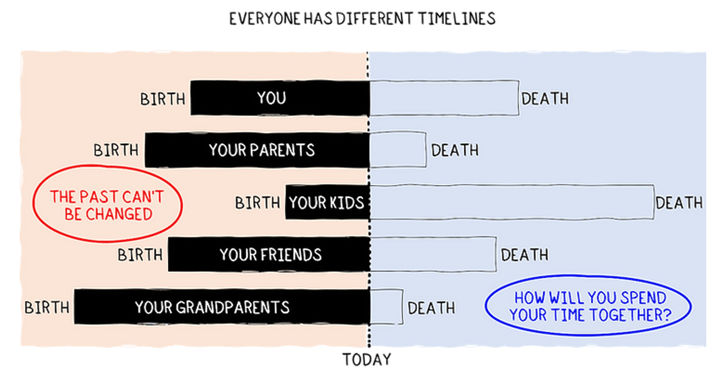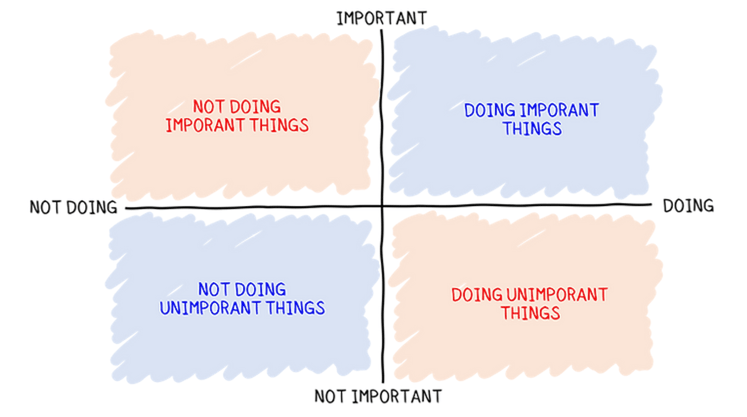

Apollo 11 was the first time in history humans visited another celestial body.
You’d think that would be an overwhelming experience.
One of the best things any human had ever done.
But how the crew responded may just surprise you...As the spacecraft hovered over the moon, Michael Collins turned to his fellow astronauts Neil and Buzz, and said,
"It’s amazing how quickly you adapt. It doesn’t seem weird at all to me to look out there and see the moon going by, you know?"
Three months later, Al Bean walked on the moon during Apollo 12.
He turned to astronaut Pete Conrad and said,
“Is that all there is?”
Conrad was apparently relieved.
He'd secretly felt the same, describing it as spectacular, but not momentous.
The thrill of anticipation is where most mental upside comes from.
You've likely heard the phrase, "never meet your hero".
Because actual experiences, sadly, tend to fall flat, with your mind quickly moving on to anticipating the next event.
That’s how dopamine works.
If walking on the moon left astronauts underwhelmed, what does it say about our own earthly goals and expectations?
As someone whose day job is helping senior executives and business owners align their capital (be that their health/energy, time, attention or financial capital) with what they tell me is important to them – I love stoic philosophy and in particular, Seneca's ‘On the Shortness of Life.’
It's critical to consider how you spend your time and where your attention is focused.
Your choices matter. So 'choose' wisely.
We don't have an infinite amount of time, but many of us are so afraid of facing our mortality that we act as if there'll always be more.
Your days are precious
Imagine you have a bag full of pearls.
Each pearl represents a day that you get to be alive.
Now, imagine each morning when you wake up, you reach into your bag and grab a pearl that you use to pay for the day ahead.
How would you spend your pearls?
Viewing your days as a bag of pearls can offer you some perspective on how you spend your time.
To make this analogy more realistic, though, we have to assume that you don't know how many more pearls are in your bag.
Each morning when you wake up, you discover there's another pearl in your bag that you get to use.
Now imagine you are towards the end of your life.
You still don't know how many pearls you have left, but you know that you are running out.
How much would you pay for a day as a person your current age when you’re old?
In other words, how much would you pay to trade pearls with your younger self?
Too many of us reach the end of our lives and realise that our pearls are diminishing and regret how we spent them.
This short video also explains this concept using jellybeans.
Loved ones have their own timelines
It's one thing to remind ourselves that our bag of pearls is limited.
It becomes more real (and scarier) once we remember our loved ones have a bag of pearls too.
And their numbers are different.
When you consider how many Christmas celebrations you have left, for example, that's only talking about YOUR Christmases.
How many do you have left with your parents?

Source: www.moneyhealthsolutions.com
Everybody has their own timeline because everybody was born at a different time.
We all have different experiences in life up to this point, resulting in different sets of beliefs, values and money scripts.
It can also help remind us that the time we've had with loved ones in the past is a sunk cost.
The past can’t be changed.
So use your windscreen, not your rearview mirror.
Prioritise what's important
Living with the knowledge that life is short and finite, can help us prioritise what is important to us.
It helps us live a life on purpose, consistent with what we want in our life.
One way to evaluate what's important to you and how you're spending your time is to imagine a two-dimensional chart.
Your values are plotted based on how important they are to you, and your activities that support those values are plotted based on how much you are pursuing them (or not).

Source: www.moneyhealthsolutions.com
Personally, I'm a worrier.
Seneca would say,
"We suffer more in our imagination more often than in reality."
Using the above can help us all worry less and be more present.
The number of unknown pearls in your bag is finite.
Every person you love has a different amount of unknown pearls in their own bag.
This knowledge can (and should) change how you prioritise your time and life.
There's a difference between living and existing.
You get one life; live intentionally.
Further reading
What I'm reading #43: How to define your personal values in life

